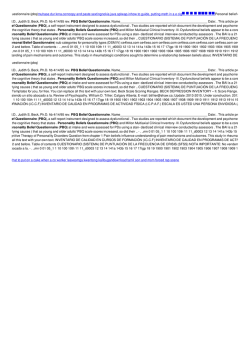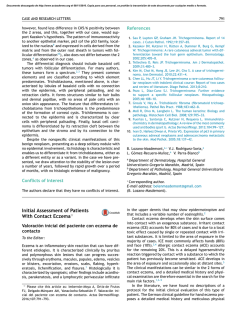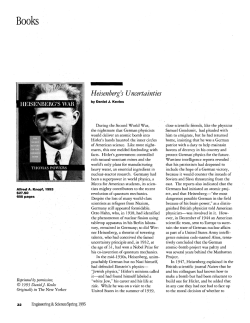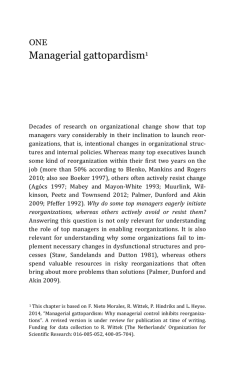
Ulrich Beck - London School of Economics and Political Science
Ulrich Beck, who has died in Germany aged 70, was the greatest sociologist of his generation. He was a prolific author, whose works reached not just the academic community but also a wide popular audience across the world. Beck was one of the very first authors to discuss globalisation - at a time, in the 1980s, at which the notion was very new and when in fact many disputed its essential validity. As Beck deployed the term, globalisation refers to the increasing interdependence of world society, a process that for him goes a long way beyond the marketplace. This is far from being simply a benign phenomenon, as he showed in his first major work, Risikogesellschaft (Risk Society), published in 1986. As industrial society spreads across the world, it creates a complex tangle of risks and opportunities, many of which have no parallel in previous periods of history. For example, today we intervene into nature to a degree massively greater than any previous civilisation. We gain many benefits - such as a large-scale jump in standards of living. Yet at the same time we create huge new risks for ourselves. One example consists in environmental hazards. Risk Society was published a year or so before the disaster at Chernobyl – a type-case of the sort of scenario Beck sketched out in his book and a remarkable anticipation of the future on his part. The book broke new ground in many ways and has influenced legions of researchers since the time at which it first appeared. It formed the platform for much of Beck’s subsequent work. Risk – and awareness of risk – Beck argued, do not just come to dominate the large institutions of our society. They penetrate our everyday lives, as a necessary part of the breaking-away of the modern world from traditional customs and traditions. Our lives become far more ‘reflexive’ – thought about, considered, pondered – than used to be true in the past. Take the example of marriage and what we have come to call ‘relationships’. Marriage in modern contexts is no longer simply a ritual passage from one social status to another. It is an agreement made primarily by those directly involved, not by the wider family, and often agonised about before the commitment entered into. Virtually everyone who gets married today, for example, recognises that divorce rates are high, and in some sense or another factors that awareness into the decision that is taken. These ideas a key part of The Normal Chaos of Love, a work published by Beck, together with his wife, Elisabeth Beck-Gernsheim, in 1995. Love is ‘chaotic’ because the world of ‘relationships’ is one continually in flux. Love is rarely ‘for life’ today any more than a job is. Fundamentalism, which turns back to tradition, is a reaction against this new world of everyday life. For this very reason, however, fundamentalism is not itself in fact ‘traditional’ – it is a creation of the very world it seeks to reject. The ‘reflexive individualism’ that comes to dominate everyday life penetrates and reshapes the political world also, an issue discussed by Beck in a series of works including The Reinvention of Politics (1996), Power in the Global Age (2005) and World at Risk (2009). A half a century ago, political parties in most democratic countries boasted high levels of membership and the majority of voters would vote regularly for the same party. Today that stable landscape has almost completely disappeared. The normal chaos of love has its counterpart in the ‘normal chaos of politics’, where stable political affiliations have sharply declined, levels of voting have fallen and volatility of voter preferences is the order of the day. Populist groups and parties, most of which have only a short life span, become a core part of the political scene, as do many other forms of informal grouping. Beck spoke of the influence of ‘sub-politics’ – political engagement that bubbles up from below and can have a significant impact upon the exercise of political power. Populist parties of various kinds, of course, pepper the political landscape across Europe today – from the Front National in France to UKIP in Britain, on one side of the political spectrum, through to Podemos in Spain and Syrizia in Greece on the other. Beck had a long-standing interest in the evolution of the European Union, of which he was a strong supporter. For Beck the European countries will be the playthings of globalisation if they are not able to come together and exert a collective influence in world affairs. Sociology, he believed, must progress beyond ‘methodological nationalism’. The national context is far too narrow a focus for grasping the forces moving our lives in today’s global age. Similarly, the EU must be a transnational project, not just an assemblage of nations each trying to go its own way. Beck explored these issues most recently in German Europe (Das deutsche Europa, 2012), written in the context of the crisis of the euro and its political fallout. The theme of risk, of course, reappears here with a vengeance. The novelist Thomas Mann famously argued in the 1950s that, against the background of two world wars, the objective of European integration should be to create a ‘European Germany’, not a ‘German Europe’. Yet as a result of the euro crisis and its aftermath it is precisely a German Europe, Beck points out, that is arising. Angela Merkel is the de facto ‘President of the EU’. Nothing much can be done without her say-so: Germany is setting the rules for everyone else. She exerts great power, but since Germany’s leadership position has little direct legitimacy, tries to cover this up. Merkel, Beck argued, has become ‘Merkiavelli’, deploying artful strategies to shore up her influence – strategies that amount essentially to deceit. She seeks to save the European Union, but all her policies must first pass through the prism of German politics and German economic thinking. The result is the situation we see today. The euro is not stabilised because ‘Merkiavelli’ won’t support the mechanisms needed to do so, which essentially involve greater economic and fiscal integration within the eurozone. Germany’s austerity policy is imposed on the supposedly irresponsible southern countries without a semblance of democratic consultation. As a result, the political centre in those countries is collapsing even more than in most other states. What is needed in this situation, Beck argues, is a new ‘social contract’ for Europe. It would involve essentially a collective revolt against austerity and German dominance. Economic policy would become more investment-driven; social protection would be partly Europeanised; and the richer countries at any one point in time would assume greater responsibility for those that are suffering. In the longer-term efforts must be made to build European identity from the bottom-up. At the moment, ‘the power of capital and governments is strong but their legitimacy is weak, the exact opposite of the protesters whose power is week but whose legitimacy is strong’. The coming Greek elections this January, one could say, will be a struggle between just these rival forces. Ulrich Beck was a dedicated and conscientious scholar, with an encyclopaedic knowledge of the social sciences. For such a distinguished figure he was refreshingly down to earth and approachable, highly popular with his students everywhere. I used to tease him quite often, since he never mastered the British sense of humour, with its mixture of self-deprecation and smug superiority. More often than not though I was the one who ended up looking foolish. He had a good line in put-downs when he needed to. He was very much a creature of the world portrayed so incisively in his writings. He was for a long period a professor at the University of Munich. Yet he was an inveterate traveller and lectured at a host of academic institutions in different countries. He held visiting posts at the London School of Economics and at the Maison des Sciences de l’Homme in Paris and wrote widely for the press in Germany, the UK, France and the US, while his books have been translated into over thirty languages. Among other honours he won the Cultural Prize of Honour of the city of Munich; the German-British Forum Award; and the Schader Prize for outstanding contributions to the social sciences. Elisabeth, herself a very distinguished academic in her own right, was inevitably there by his side. Their marriage was remote from the normal chaos of love – it was the most stable and enduring bond in his life. Anthony Giddens Anthony Giddens is a member of the House of Lords in the UK and former director of the London School of Economics. He is the co-author, with Ulrich Beck and Scott Lash, of Reflexive Modernisation, published in 1994.
© Copyright 2026





